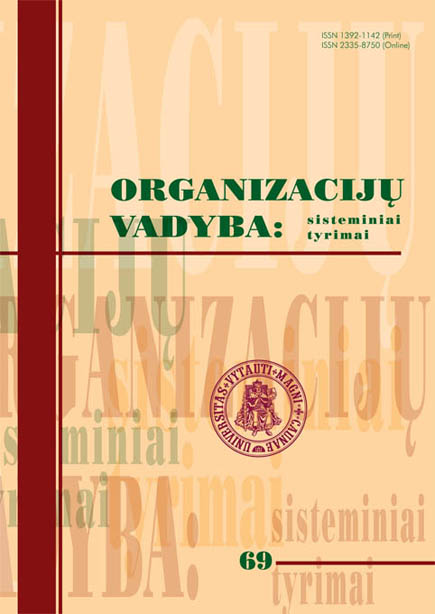Lietuvos turistų pasitenkinimo indekso modelis: teorinės įžvalgos
Elaboration of Lithuanian tourist satisfaction index model: theoretical insights
Author(s): Lina Pilelienė, Viktorija GrigaliūnaitėSubject(s): Economy
Published by: Vytauto Didžiojo Universitetas
Keywords: Lietuvos turistai; Pasitenkinimo indeksas; Turistų pasitenkinimas; Vartotojų pasitenkinimas; Customer satisfaction; Lithuanian tourists; Satisfaction index; Tourist satisfaction
Summary/Abstract: Straipsnyje analizuojami turistų pasitenkinimą lemiančių veiksnių bei turistų pasitenkinimo pasekmių šalims teoriniai aspektai. Turizmas tapo viena greičiausiai besivystančių paslaugų sektoriaus sričių ir tai lėmė mokslinės analizės apie turistų pasitenkinimą ir lojalumą poreikį. Kadangi turizmo sektoriaus vystymasis neaplenkė ir Lietuvos, straipsnio tikslu tapo teorinio turistų pasitenkinimo indekso modelio, taikytino Lietuvos gyventojams, sukūrimas. Atlikta mokslinės literatūros analizė leido nustatyti veiksnius lemiančius turistų pasitenkinimą ir galimas turistų pasitenkinimo pasekmes. Autorės pristato teorinį Lietuvos turistų pasitenkinimo indekso modelį bei pateikia praktinės sukurto modelio taikymo galimybes. Relevance of the research. Customer satisfaction researches can be named as one of the most popular scopes in the marketing research area. Customer satisfaction is evaluated by customer satisfaction index, which is reflected by the customer satisfaction index model. A wide variety of national and international customer satisfaction index models can be found in the world. The evaluation of customer satisfaction index provides the level of customer satisfaction with the product, organization or sector. Previous customer satisfaction researches (see Grigaliūnaitė, Pilelienė, 2012, 2013; Pilelienė, Grigaliūnaitė, 2012, 2013) revealed that customer satisfaction is not a homogenous concept – there is a set of internal and external factors, each of which individually or in interaction with others affects customer satisfaction with the object (product, organization, sector). Tourism has become one of the fastest developing areas of the service sector not only in Lithuania, but in the entire world; the importance of tourism is constantly growing. M. M. Selladurai and K. K. Sundararajan (2013) suggest that when developing tourism industry, the aim for many countries should be tourist satisfaction. The worldwide researches on tourist satisfaction (such as: Krešic, Prebežac, 2011; Song et al., 2011; Al-Majali, 2012; Siri et al., 2012; etc.) revealed that application of traditional customer satisfaction indexes in tourism does not achieve optimal results. Furthermore, the determinants of tourist satisfaction vary in different countries due to the residents’ values, habits, cultural heritage or lifestyle (Quintal, Polczynski, 2010). The problem of the research rises out of the question: what are the determinants of tourist satisfaction? Considering the fact that tourism has become one of the fastest developing areas of the service sector in Lithuania, the research aims to elaborate the Lithuanian tourist satisfaction index model. Accordingly, the object of the research is tourist satisfaction; and the aim of the research is to elaborate the theoretical tourist satisfaction index model which could be applied for people in Lithuania. applied for the theoretical analysis – the logical analysis and synthesis of the scientific literature.
Journal: Organizacijų vadyba: sisteminiai tyrimai
- Issue Year: 2014
- Issue No: 69
- Page Range: 107-118
- Page Count: 12
- Language: Lithuanian

